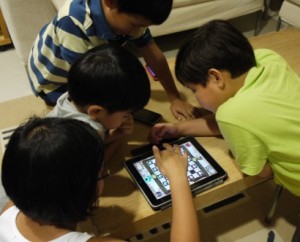A flurry of vendors and educational provider were sharing ideas, buying and selling this week in Dubai at the Gulf Education Supplies and Solutions (GESS) exhibition and Global Education Forum (GEF). There was no doubt that the introduction and integration of technology dominated the educational souk this year. The opening session had GCC Ministers of Education sharing their  intentions for greater investment and attention to making sure all schools have technology. HE Humaid Al Qatami announced the expansion of the Mohammad Bin Rashed Smart Learning Programme in the UAE while Prince Faisal Bin Abdullah Bin Muhammad Al-Saud talked about the need to ensure the use of technology in schools was responsible to protect the youth of Saudi Arabia in these fast changing times.
intentions for greater investment and attention to making sure all schools have technology. HE Humaid Al Qatami announced the expansion of the Mohammad Bin Rashed Smart Learning Programme in the UAE while Prince Faisal Bin Abdullah Bin Muhammad Al-Saud talked about the need to ensure the use of technology in schools was responsible to protect the youth of Saudi Arabia in these fast changing times.
Corporate ICT giants were there promoting the use of robots, tablets, online textbooks, simulations, gaming, and the list continues. The promise to educational providers was loud and clear: If you want to produce 21st century learners, these technologies need to be in your classrooms. Kids today are already using computers, tablets, Smartphones, etc. They know more about how to manipulate social media and access information than most adults. If a child is curious today, they will find the information they need online. So the education community needs to keep up – and they do this by making the leap and buying the hardware and software.
So what about the role of the teachers?
HE Dr. Madiha bint Ahmed Al Shibaniyah, Minister of Education in Oman, consistently attended to this point in the opening panel of GEF. Teachers are at the heart of learning and they will be the ones who create the opportunities to learn for students utilizing the technology in classrooms. They are the facilitators of learning. So it is the teachers who require support and training to enable them to readily guide this next generation in using the technology as a tool to develop the skills and knowledge to succeed.
This is a shared challenge with parents who find themselves at a loss wondering how to make the time their kids are connected on a devie more worthwhile? This parental concern is the motivating force behind groups like Technorati, hosting women bloggers (including former Silicon Valley Moms Group) that offers content about parenting in the digital age. Consider the latest post from Beth Blecherman, founder of TechMamas.com, asking:
Does Gamification Help Classroom Learning?
She offers strategies like using Minecraft to better understand Newton’s Law of Physics has been beneficial for her son. She promotes this use of a game because she has the immediate feedback from her own son. Notwithstanding this evidence in her home, she still asks the question of the utility of this approach in schools reflecting on the idea that it is only a tool.
She asks because she knows that it is HOW we use the tools to engage kids in learning that matters.
These mothers are asking the question that was markedly absent from the prevailing discourse at GESS:
What is the effect of these technologies on learning and achievement?
After several conversations with various vendors and operators at GESS, it seems that there is a minimal level of monitoring to determine teacher perception on using certain technologies like i-pads in their classrooms. The question of impact on student learning and achievement seems to fall silent under the roar of marketing promises and the demand for ICT classrooms.
I look forward to next year when vendors and operators will perhaps share evidence on how these investments have improved student success, as defined by student engagement, learning, and achievement.
There has to be some balance and children should also be encouraged to think. Solving problems independently is learning.
Use of technology to understand every concept may result in students not using any imagination and always looking for ready answers. It is easy come easy go.
I really appreciate this post. Iˇ¦ve been looking everywhere for this! Thank goodness I found it on Bing. You’ve made my day! Thanks again
It is high time we start identifying the skills required for survival in today’s micro-cosm. There is an unrgent need to focus on introspection and identification of problems and means of solving them. The focus has to shift from tools to problems and their solutions. Tools are a means and not an end.
Arun Warhadpande
I believe as long as we plan and have goals that we are aware of and not just run toward technology for the sake of technology, we will be able to promote problem solving and critical thinking skills.
Identifying goals has to be the focus. Means for achieving goals can be found.